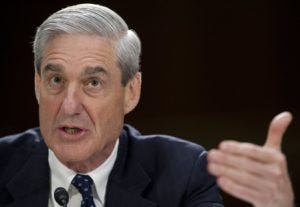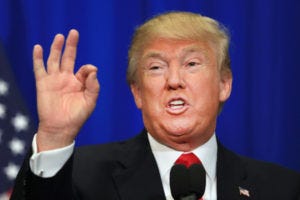Mueller's Potential Interview of President Trump: Q & A
Will Robert Mueller interview president Trump? Trump’s attorney John Dowd recently resigned, reportedly in part because the president was resisting his advice to refuse to be interviewed. Following the raids on the office and home of Trump’s personal attorney Michael Cohen, Trump was said to be "rethinking” whether he would agree to an interview after all. Then Rudy Giuliani joined the president’s legal team and suggested the possibility of an interview was still on the table. Finally, last week, the New York Times published a leaked list of about four dozen questions Mueller reportedly wants to ask Trump if an interview takes place. Trump himself has repeatedly claimed, including as recently as last week, that he’d love to sit down with Mueller. In light of these developments, it seems like a good time to review some of the issues surrounding the possible interview.

Special Counsel Robert S. Mueller, III
What Does Mueller Want to Ask Trump?
If the New York Times list of questions is accurate, it appears Mueller wants to ask about two areas: 1) obstruction of justice; and 2) involvement with Russians in connection with the election. No real surprise there; those two issues are at the heart of Mueller’s inquiry. The list does not include any questions about more tangential areas, such as the president’s personal finances or hush money payments to porn stars. About three-quarters of the questions relate to possible obstruction of justice by Trump himself. Many of these questions ask what the president was thinking when he did things like firing James Comey. They relate to the central issue in any obstruction of justice case: corrupt intent. Why the president did certain things is critical. If done with the corrupt intent to interfere with the Russia investigation, otherwise lawful acts could become obstruction of justice. The other set of questions focuses on contacts and interactions with Russians by members of the Trump campaign and Trump himself. These relate to the issue of so-called “collusion” – conspiracy with Russians to influence the election, perhaps in exchange for easing U.S. sanctions against Russia if Trump won. These questions demonstrate the investigation into a possible Russian conspiracy is still very active. Mueller has already indicted thirteen Russian nationals and three Russian companies for interfering with the election, primarily through social media. But there are a whole host of events that have not yet resulted in charges, including the stolen and leaked Democratic emails, the pro-Russia change in the Republican party platform, and alleged discussions about easing sanctions. That Mueller wants to question the president about these details is an indication there may be more to come from the special counsel concerning conspiracies to influence the election.
Does Mueller Need the Interview?
Need? Not really. Prosecutors are accustomed to proving their cases without the opportunity to interview people at the top. Those under investigation frequently assert their rights under the Fifth Amendment and refuse to be questioned. Whether or not Trump ever speaks with Mueller will not determine whether Mueller will be able to proceed, whether on obstruction of justice or on a Russian conspiracy. That being said, there’s no doubt the interview would be extremely useful for Mueller – and for the country. As the candidate and head of the campaign, Trump likely knows a great deal about any interactions his campaign had with the Russians. And when it comes to possible obstruction of justice, Trump alone really knows what was going on in his head when he did things like fire Comey. Given the opportunity, any prosecutor would love to hear from the potential defendant’s own mouth why he did what he did.
Doesn’t Mueller Already Know all the Answers?
In the news coverage about Mueller interviewing Trump, commentators and journalists frequently repeat the old saying, “A good lawyer never asks a question to which he/she doesn’t know the answer.” The suggestion is that Mueller simply wants to question Trump to see whether what he says is consistent with information Mueller already has. But that’s not the whole story. That saying about the good lawyer is true (or mostly true, anyway) when it comes to a trial. But it’s not true for an investigative interview or grand jury. A trial is a presentation to a jury of an assembled case, and the lawyer should indeed already know the answers to the questions. But an investigation is an exploration to gather facts and determine whether a case exists. Investigators ask questions to which they don’t know the answer all the time. If you only asked questions to which you already knew the answer, you would never advance your investigation very far. Unfortunately, incorrectly repeating this trial lawyer aphorism feeds the false defense narrative that the only reason Mueller wants to interview Trump is to try to catch him in a lie or create a “perjury trap.” If Mueller already knows everything, why else would he want to talk to the president? The truth is that Trump is uniquely positioned to have relevant information about this case, including some information that no one else may have. Mueller certainly has some information about each area of questioning, and will have theories about what the answer is. But if given the opportunity Mueller will definitely be asking some questions to which he does not know the answer, and would expect to learn at least some new information.

Does Trump Really Have a Choice?
Yes. The important distinction here is between an interview and a grand jury appearance. When it comes to an interview, the president does have the right to refuse. No one is required to talk to federal prosecutors or investigators. If agents come knocking on your door, you’re free to tell them to get lost. (It's true we should hold a president to a higher standard, but that's a political and moral issue, not a legal one.) That’s why there has been all the back and forth about the possible terms and conditions of an interview. Trump’s lawyers have the ability to try to negotiate more favorable terms because Mueller knows they could ultimately refuse to agree to any interview at all. But in the end Mueller holds the ultimate Trump card (sorry) – the grand jury subpoena power. News reports last week indicated that during negotiations with Trump’s lawyers Mueller has already floated the option of subpoenaing the president. Although everyone has the right to refuse a voluntary interview, no one has the right to refuse a grand jury subpoena. A subpoena compels the witness to attend and testify under oath, absent some kind of a legal privilege. Both sides therefore have some leverage and both have some incentive to compromise. Mueller knows Trump could walk away and refuse the interview, forcing him to decide whether to issue a subpoena. And Trump knows that if he does refuse an interview, Mueller has the option of going down the grand jury subpoena road.

How Would a Grand Jury Appearance Differ from an Interview?
Grand jury testimony is under oath and therefore subject to perjury and an interview typically is not, but legally that makes little practical difference. It’s still a crime to lie to investigators during an unsworn interview. That crime is called false statements, the crime to which Michael Flynn and George Papadopoulos pleaded guilty. The biggest difference is that during a grand jury appearance the witness is examined in the grand jury room by the prosecutor without the presence of his attorney. The lawyer is outside the room and the witness may step out to consult, but counsel is not present during the questioning. During a voluntary interview defense counsel is present and can participate by seeking clarifications, objecting to questions, interacting with the prosecutors, and consulting with the client. For that reason, all else being equal, a voluntary interview generally is much friendlier terrain for the defense than a grand jury appearance.
Will Trump Agree to an Interview?
It’s unlikely. I’ve thought for some time that ultimately Trump will refuse to be interviewed, for reasons I explained here. It’s just too dangerous for him. Even if his underlying conduct ends up not being criminal, lying during the interview would be a separate crime. Trump’s frequent lies on all kinds of topics have been well documented, and even his own lawyers have suggested he might not tell the truth during an interview with Mueller. You'd be hard pressed to find any lawyer familiar with this case who would recommend that Trump agree to this interview. The president’s strategy thus far has been to attack the investigators and call the investigation an unfair “witch hunt.” In the end I believe he will refuse to be interviewed and will claim that, although he has nothing to hide and personally would love to take on Mueller, his lawyers say he can’t subject himself to such an unfair process.
What If Trump Refuses to be Interviewed?
If Trump refuses to be interviewed, then the ball will be in Mueller’s court. He will have to decide whether to subpoena the president to the grand jury. As I noted above, unlike an interview, a grand jury subpoena is mandatory. A witness who refuses to appear without a valid legal excuse can be held in contempt and be jailed. But of course when the witness is the president of the United States it's not quite that simple. Whether the president can be subpoenaed to testify in the grand jury has never been definitely settled by the Supreme Court. The Court did hold in the Paula Jones case that the president is not immune from appearing in a civil case based on conduct that took place before his presidency. In the Nixon case the Court ruled a president has no blanket right to refuse to comply with a grand jury subpoena for documents and records. Most legal observers believe that if the question of a grand jury subpoena of the president for testimony came before the Court, it would again hold that the president is not above the law and must comply like any other citizen. But there’s no doubt that Trump’s lawyers could tie things up for a while. They could mount constitutional challenges to the subpoena based not only on the president’s unique status as the head of the executive branch but also on claims of executive privilege. Even if the courts fast-tracked the case, it would certainly take a number of months to resolve. Mueller may well conclude that the time and effort involved in issuing and fighting over a subpoena is not worth the resulting delay in his investigation. That’s particularly true considering that, even if Mueller were ultimately to prevail, the president could end up taking the Fifth in the grand jury and leave Mueller without the information anyway.
Can Trump take the Fifth? What Would Happen Then?
Yes, if subpoenaed to the grand jury, Trump could assert his Fifth Amendment right not to incriminate himself and refuse to testify. This past weekend Rudy Giuliani suggested that Trump might take the Fifth. That’s his right if his fear of incrimination has a good-faith basis. The question then becomes what would be the political consequences. Some commentators have suggested that taking the Fifth would be the end of Trump’s presidency; that it would surely be the straw that breaks the camel’s back and leads to impeachment. I’m not so sure. It seems at least as likely to me that Trump could simply repeat his claims of a “witch hunt” and say he was forced to assert the Fifth because the entire investigation is political and unfair. If he did that, his political base and Fox News may well stay with him – and if they stay with him, Republicans in Congress may stay with him as well. Eighteen months ago I would have agreed that any president forced to take the Fifth would certainly be a goner. But in the age of Trump I’m no longer convinced that’s the case. It may just be that there would be a few days of outrage and then the country's attention would shift to whatever new scandal comes along. In terms of Mueller's investigation, if the president takes the Fifth Mueller will just go on to complete the investigation without Trump's testimony. And as I mentioned above, not having testimony from those at the center of the investigation is not at all unusual for a prosecutor.
What if Trump Just Refused to Honor the Grand Jury Subpoena?
It’s possible that even if the Supreme Court upheld a grand jury subpoena, Trump could refuse to appear. In an ordinary case, that would result in the court sending U.S. Marshals to arrest the witness, and the witness could be jailed until he agreed to testify. But with the president that raises obvious difficulties – not the least of which would be the possible stand-off between the Secret Service and the Marshals. It all starts to sound like the plot of a bad political thriller on cable television. This is where we get into some scary possibilities. During Watergate, in the end our institutions survived because when the Supreme Court ruled against Nixon he didn’t defy the Court. He agreed he was bound by the Court’s order and resigned shortly thereafter. During the presidential election of 2000, Al Gore ultimately accepted the decision of the Supreme Court and bowed out, avoiding a potential further crisis over the outcome. The Supreme Court's power depends entirely on our national commitment to the rule of law. We don’t have any real experience with what happens if the Court rules against a president who doesn't necessarily share that commitment. That’s where the idea of a “constitutional crisis” becomes real. If Trump were to defy a ruling of the Supreme Court, he would truly be placing himself above the law. Presumably that would finally be a bridge too far and Congress would move to impeach him. And presumably, if that happened, Trump would agree to abide by the outcome of the impeachment process. Presumably.
Like this post? Click here to join the Sidebars mailing list

